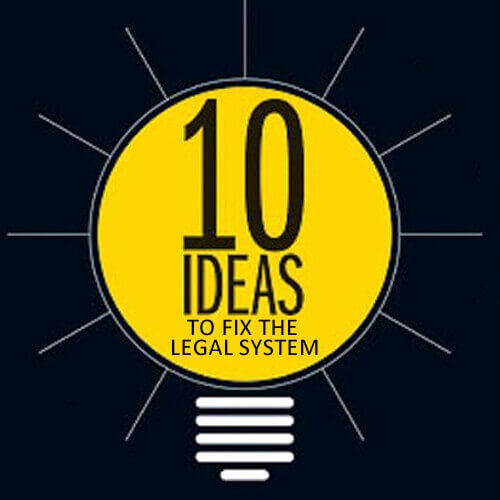Trust in the Legal System at an All-Time Low

Recent polls confirm that public confidence in legal institutions and lawyers is at historic lows. Gallup’s June 2016 poll indicates that only 36 percent of Americans have a "great deal" or "quite a lot" of confidence in the Supreme Court; and only 23 percent feel that way about the criminal justice system. How do lawyers fare? Only 15 percent of the public has a high degree of confidence in them. The question is where do we go from here and how can public faith in lawyers and the legal system be restored? The simple answer is that it is not going to be a quick or easy fix, but we offer ten thought-provoking solutions below.
- Get rid of immunity altogether, be it judicial or prosecutorial. There is nothing at all in the U.S. Constitution about it. Immunity is something our wonderful judges have bestowed upon themselves. They were kind enough to give themselves this privilege in a similar way that our legislators give themselves special health care plans and other perks. Take immunity out of the picture, and many, perhaps most, of our renegade judges would snap back in line for fear of being accountable to the public—as they really should be.
- Separate the career paths for lawyers and judges and not allow any lawyers to be judges and vice versa. Training to become a lawyer would lead one to become a lawyer; training to become a judge would lead one to become a judge. The two professions would have as much in common with each other as professional bowling and meteorology. This crossover from one profession to the other perpetuates the “good ol' boy” network. Take away the opportunity for favoritism, and favoritism should vanish.
- If a person wants to be part of the legal system, such as a police officer, lawyer, clerk, or judge, it should be a requirement to spend some time in jail. The people responsible for sending others to prison should know what it’s like. As responsibility and power increase, the length of time should increase. A day in jail seems reasonable for a clerk. Maybe two days for a police officer, and possibly three to five days for judges at the highest court levels.
- To discourage corruption for those in the legal system, the penalties for system members should automatically be more severe than for those outside of the system. Something on the order of a factor or two or three. So, if a financial penalty for the average person is $10,000 for a particular criminal offense, it should be $30,000 for a judge or police officer, for example.
- Get rid of arcane laws that are no longer applicable and laws that are completely idiotic. The sheer number of laws in this country is so overwhelmingly large, we think that lawmakers should have to get rid of a law if they want to create a new one. To accelerate the reduction, legislators would have to remove ten laws from the books for every new one they create, with the ratio dropping periodically until it reaches one-to-one in the next two or three decades perhaps.
- Oversight organizations for lawyers and judges should have no more than one lawyer or judge on each. Each governing body would be mostly composed of educated lay people. The way it stands now, most of these boards consist of lawyers and judges. Having the fox guard the henhouse is not the best way to keep the chickens safe.
- Establish a truly independent, outside organization or committee of “moles” that acts as a check on the judicial system—almost like “secret shoppers” at retail stores. Each “mole” would observe courtroom proceedings unannounced and incognito and report corrupt judges, prosecutors, bailiffs, clerks, and others to the committee's superiors. This committee could even be part of the oversight organizations or at least be the appellate channel for them so that when the 98 percent of all complaints against lawyers and judges get swept under the rug as they do now, a citizen would have a real chance of redress.
- In a criminal case, if the defendant is found to be not guilty or the case is otherwise dismissed, the prosecutor and/or the alleged victim should pay the defendant’s legal fees. This would go a long way toward eliminating politics and establishing fair play in the criminal system.
- Make our prisons truly private with competition, not exclusively private so that contracts are given to only one, possibly the lowest bidder. In our nation today, the majority of “privatized” prisons have it written into their contract that the occupancy rate must be maintained at a relatively high level. This incentivizes the system to fill the jails to capacity.
- law enforcement organizations across the country are issued weaponry that is highly dangerous. To mitigate shooting of innocent or unarmed people, training at all levels of law enforcement must be improved. At least some post-high school education should also be mandatory—two years of college, for instance.
There you have it. All are logical, straightforward ideas that would certainly have a positive impact, albeit many might be considered a pipedream. Nonetheless, implementing just half of them would greatly improve our system rather quickly. If you have others you think would also help, feel free to comment below.



 "The most important book written this century for Americans!"
"The most important book written this century for Americans!"








Comments
If you want to comment as a guest without signing in with social media and without signing up with Disqus:
1 – Enter your comment2 – Click in the Name box and enter the name you want associated with your comment
3 – Click in the Email box and enter your email address
4 – Select "I'd rather post as a guest"
5 – Validate the CAPTCHA and then click the arrow
comments powered by Disqus